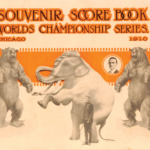History of the World Series – 1962
Entering the ninth, Tarry had allowed only two hits to the Giants — the first coming with two out in the sixth — and held a 1-0 lead. After pinch-hitter Matty Alou led off the inning for San Francisco by bunting for a base hit, Terry struck out Felipe Alou and Chuck Hiller. Willie Mays, who had just completed a 49-homer, 141-RBI season, then lashed a double to right, a smash on which Roger Maris made a running grab of the bounding ball and a prompt throw to cutoff man Bobby Richardson. Maris’ defensive work forced Matty Alou to hold up at third base.
With first base open, Giants cleanup hitter Willie McCovey strolled to the plate and Orlando Cepeda moved into the on-deck circle. Yankees Manager Ralph Houk decided to let righthander Terry pitch to the lefthanded-hitting McCovey, who had tripled in his previous at-bat (but was coming off a 20-homer, 54-RBI season, compared with righthanded-hitter Cepeda’s 35-homer, 114-RBI year).
Terry, who in the seventh game of the 1960 Series yielded Bill Mazeroski’s decisive, last-of-the-ninth home run and then in Game 2 of the 1961 Series suffered New York’s only defeat of that fall classic, had won 23 games for the Yankees in ’62 and was a complete-game winner in Game 5 of this Series. Getting McCovey in this incredibly tight spot would mean postseason redemption for the 26-year-old Terry, whose big-league career hardly needed redeeming (a 39-15 record over the previous two years).
With a one-ball, one-strike count on McCovey, Terry let fly with another pitch. And McCovey nailed it. The ball shot toward right field, but second baseman Richardson moved slightly to his left and threw up his glove. The ball nestled in and the New York Yankees had won a second straight World Series.
While no one could dispute that luck had played a major role in the Yankees’ Series supremacy this time — an ever-so-slight variation in the path of McCovey’s liner would have made the Giants champions — there was no disputing the gaudy numbers that the American Leaguers had put up. By beating Manager Alvin Dark’s Giants, the Yankees had won exactly half of all World Series played dating to 1923 (when the Yanks won the fall classic for the first time). Twenty Series crowns in 40 years. And those 20 Yankee titles had come in 25 Series appearances by the Bronx Bombers over that 1923-1962 span.
Winning in ’62 not only took talent and luck, it also required endurance. Rain caused a one-day delay in Game 5 at Yankee Stadium and wet weather forced three consecutive postponements of Game 6 at Candlestick. With two open dates thrown in for coast-to-coast travel, it meant the Yanks and Giants waged their struggle over a 13-day period and equaled the record calendar time needed to complete the rain-marred 1911 Series.
The Yankees prevailed despite failing to win consecutive games at any point in the Series and getting .174 and .120 batting marks from Maris and Mickey Mantle, who had combined for 63 home runs during the regular season after poling a total of 115 in the previous year. While Mantle failed to hit a homer or even drive in a run against the Giants, Maris did lead the New Yorkers with five RBIs and he got two of those with a first-inning double in Game 1. Whitey Ford was a 6-2 winner in the opener, posting a record 10th Series triumph and stretching his consecutive-innings scoreless streak in the fall classic to 33 before San Francisco got on the scoreboard in the second inning. The Giants’ Billy O’Dell battled Ford on even terms through six innings, but Clete Boyer’s homer in the seventh broke a 2-2 tie and the Yanks followed with two more runs in the eighth and one in the ninth.
San Francisco’s Jack Sanford fired a three-hit shutout in Game 2 and McCovey rapped a bases-empty homer as Terry and the Yankees fell, 2-0. Billy Pierce then blanked New York through six innings of Game 3, but Maris broke a scoreless deadlock with a two-run single in the seventh and eventually scored on a forceout grounder. Yankees pitcher Bill Stafford gave up a two-run homer to Ed Bailey in the ninth but held on for a 3-2 triumph.
Giants second baseman Hiller, who hit only 20 homers in his eight-year major-league career, took center stage in Game 4 when he walloped a bases-full homer off Yankees reliever Marshall Bridges in the seventh inning. The grand slam, the first in Series history by a National League player, snapped a 2-2 tie at Yankee Stadium and made a winner out of a 33-year-old San Francisco reliever who had retired only one batter in the game. That well-traveled pitcher was one Don Larsen, who six years before — to the very day — had pitched a Series perfect game for the Yankees against Brooklyn in the same park.
Terry, whose second-game loss was his fourth in Series competition without a victory, scored a breakthrough in Game 5 — thanks to rookie Tom Tresh, who broke yet another 2-2 deadlock in this fall classic when he hammered a three-run, eighth-inning homer off Sanford. New York and Terry came out on top, 5-3, despite Sanford’s l0-strikeout effort in 7 1/3 innings.
Pierce’s three-hitter and Cepeda’s three hits and two RBIs featured San Francisco’s 5-2 triumph in Game 6, which marked the first Series action in five days after a travel day and three rainouts. The rains, in fact, had created a dry spell: The Giants’ victory was their first in exactly a week. Nevertheless, this World Series was now a 3-3 standoff.
Terry’s mound opponent in Game 7 was Sanford, who worked seven-plus innings and gave up the only run in the fifth when Bill Skowron and Boyer singled, Terry walked and Tony Kubek grounded into a double play. Sanford, a 24-game winner for the Giants in ’62, left the game with the bases loaded and no one out in the Yankees’ eighth, but reliever O’Dell got Maris to hit a grounder that forced a runner at the plate and Elston Howard to ground into a double play.
Terry wound up with a four-hitter and did not walk a batter in the 1-0 clincher. He struck out four Giants, including two in the drama-packed ninth.
The Giants took solace in having won their first NL pennant since moving to the West Coast after the 1957 season. And they captured the flag in particularly satisfying fashion, rallying late in the season to tie Los Angeles for first place and then beating the archrival Dodgers, two games to one, in a playoff.
Still San Francisco came up short in the end. As McCovey, his teammates and Giants fans everywhere could tell you, inches short.



